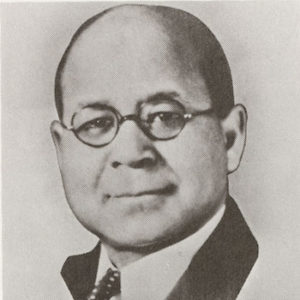
Elder Diggs
*Elder Diggs was born on this date in 1883. He was a Black writer, soldier, and scholar.
Elder Watson Diggs was born in Hopkinsville, Christian County, Kentucky, and is the eldest son of three children. His mother, Cornelia, raised Diggs and his brother (William Ellis) and sister (Effie). He received a one-room school education in Louisville, Kentucky, where he helped teach younger children. Following graduation from Indiana State Normal School in the spring of 1908, Diggs enrolled at Howard University in 1909. While a student there, he developed a friendship with Byron K. Armstrong.
During the summer of that year, Byron Armstrong visited his cousin, Irven Armstrong, at Indiana University. Bryon was so impressed that he persuaded Diggs to enroll with him in the fall. Diggs enrolled at Indiana University in the fall of 1910. In 1911, he and Armstrong founded Kappa Alpha Psi with eight other Black students. He also was the first Black to graduate with an A.B. degree from Indiana University’s School of Education in 1916. He earned his master’s degree in Education from Howard University in 1944. Diggs wrote the lyrics to the Kappa Hymn. Additionally, he established the Kappa Alpha Nu Journal, the first periodical of any national Black college fraternity.
He served as Grand Polemarch for the first six years of the fraternity’s existence. He also served as a Grand Board Member and as Grand Historian. He also established several initial undergraduate chapters in addition to the Indianapolis (IN) Alumni Chapter. He was awarded the first Past Grand Polemarch medal and Laurel Wreath. He also assisted in writing The 1928 Handbook of Kappa Alpha Psi. Diggs was an educator who held teaching positions and served as principal at public schools throughout Indiana. Diggs was married three times (Clara Bell-Smith, Elizabeth Byrd, and Lyla P. Roberts).
When the U.S. made its declaration in World War I against Germany, Diggs entered the nation’s first Negroes Officers Training Camp at Fort Des Moines, Iowa, and was commissioned a First Lieutenant. After serving in Europe with the 368th Infantry, he became Captain in the Army Reserve Officers Training Corps. Diggs also was a past commander of the American Legion. After the war, Diggs was instrumental in having the Indiana Constitution amended to permit Negro enlistment in the Indiana National Guard.
He was an active member of the First Baptist Church of North Indianapolis; a past commander of the Edward S. Gaillard Post of the American Legion; a member of the History Committee of the Indianapolis Public Schools; a member of the Leadership Training Committee, Boy Scouts of America; a worker in the YMCA; and during the late war served on the Executive Committee of the USO. Diggs was also a Central Lodge No. 1 member in Indianapolis, Indiana. The Elder Watson Diggs Award, the second-highest award available to celebrate a Kappa member’s achievements or service to the fraternity, is dedicated in his name. The Elder W. Diggs Memorial at Indiana University was constructed in his honor in 1962.
Elder Diggs died on November 8, 1947. Following his death, School #42 was named in his honor, where he served as principal for 26 years. Diggs is laid to rest at Crown Hill Cemetery, Indianapolis, Indiana.